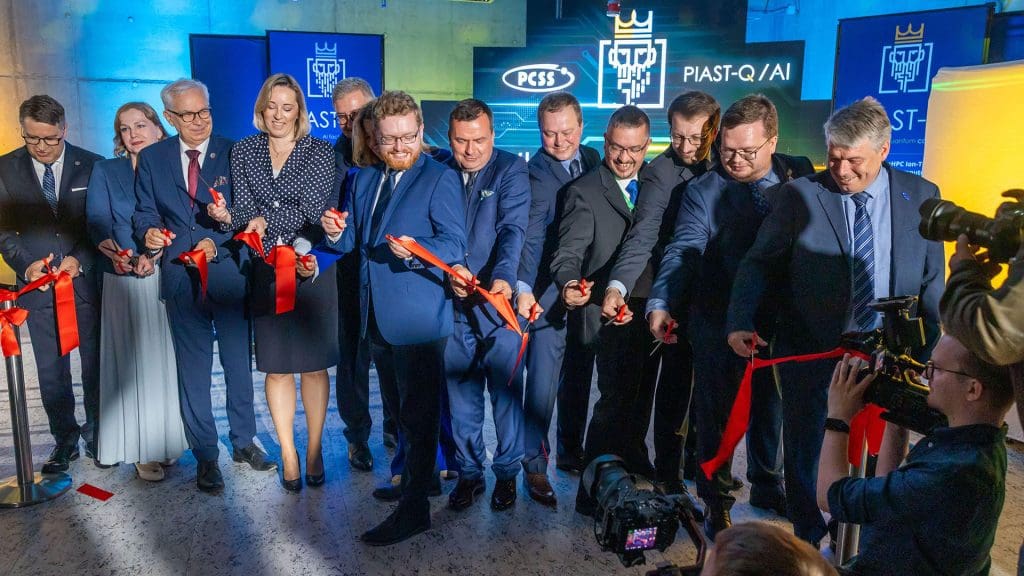Innsbruck, Austria and Pozna, Poland – The EuroHPC Joint Undertaking (EuroHPC JU) inaugurated PIAST-Q, a 20-qubit trapped-ion quantum computer, at the Poznaskie Centrum Superkomputerowo-Sieciowe (PCSS) in Pozna, Poland, on 27 June 2025. The system, procured under the Polish Presidency of the Council of the European Union, represents the first quantum computer located in Poland and the initial deployment in a planned portfolio of eight quantum computers across Europe, utilising six distinct quantum technologies. The inauguration signifies a concerted European effort, coordinated by EuroHPC JU, to establish a leading position in quantum computing and artificial intelligence, complementing existing supercomputing infrastructure and research networks such as PIONIER and GANT.
European Quantum Infrastructure Takes Shape
The inauguration of PIAST-Q in Poznań, Poland, represents a concrete advance in the development of European quantum infrastructure. Hosted and operated by the Pozna Supercomputing and Networking Center (PCSS), with technological support from Alpine Quantum Technologies (AQT), the 20-qubit system is the first quantum computer procured by the EuroHPC Joint Undertaking (EuroHPC JU) to be located in Poland. The machine utilises trapped-ion technology, a modality chosen for its potential to deliver high fidelity and long coherence times – critical factors in minimising computational errors and maintaining the integrity of quantum calculations.
PIAST-Q’s architecture offers all-to-all qubit connectivity, allowing any qubit to interact directly with any other, a feature that simplifies complex algorithm implementation. Its design prioritises seamless integration with conventional IT infrastructure, a pragmatic approach intended to facilitate adoption by researchers and industry users. The system’s connectivity to both the PIONIER national research network and the GANT network ensures access for a broad range of potential users.
The procurement of PIAST-Q is part of a wider EuroHPC JU initiative to establish a diverse portfolio of quantum computing technologies across Europe. This strategy encompasses six distinct technologies, including superconducting circuits and photonics, reflecting an acknowledgement that no single approach currently dominates the field. The EuroHPC JU has already procured ten supercomputers, with three – Jupiter, LUMI, and Leonardo – featuring amongst the world’s most powerful systems, demonstrating a commitment to high-performance computing that extends to the emerging domain of European quantum computing.
The establishment of thirteen AI factories across Europe, alongside the quantum computing initiative, suggests a deliberate strategy to foster synergy between artificial intelligence and quantum technologies. This coordinated approach aims to position Europe as a leading force in both fields, leveraging the potential of quantum computation to accelerate advancements in artificial intelligence and related applications.
System Specifications and Capabilities
PIAST-Q’s technical specifications centre on its implementation of trapped-ion quantum computing. This technology employs individual ions – electrically charged atoms – held in place and manipulated by electromagnetic fields. Quantum information is encoded in the internal states of these ions, delivering high fidelity and long coherence times – critical factors in minimising computational errors and maintaining the integrity of quantum calculations.
PIAST-Q’s architecture offers all-to-all qubit connectivity, distinguishing it from some other quantum computing approaches. This feature allows for direct interaction between any two qubits without the need for complex qubit routing, simplifying algorithm design and potentially improving computational efficiency. Seamless integration with conventional IT infrastructure is achieved through standard networking protocols and interfaces, enabling researchers to access and utilise the quantum computer alongside existing high-performance computing resources.
PIAST-Q forms part of a broader EuroHPC JU strategy to diversify quantum computing modalities across Europe. The procurement of systems based on six different technologies – encompassing trapped ions, superconducting circuits, and photonics – acknowledges the current lack of a clear technological frontrunner and aims to foster innovation across multiple approaches to European quantum computing. This diversification is intended to mitigate risk and ensure that Europe benefits from advancements in whichever technologies ultimately prove most scalable and effective.
Key Organisations Involved
The EuroHPC Joint Undertaking (EuroHPC JU), established in 2018, serves as the primary coordinating body for European high-performance computing initiatives. Beyond the procurement of quantum computers, the organisation has already commissioned ten supercomputers, including Jupiter (Germany), LUMI (Finland), and Leonardo (Italy), all of which rank among the world’s most powerful systems. This prior success demonstrates EuroHPC JU’s capacity to manage large-scale, complex technological projects and underscores its commitment to maintaining European leadership in advanced computing. The undertaking’s oversight of thirteen AI factories further highlights a strategic emphasis on synergistic development between quantum technologies and artificial intelligence.
The Pozna Supercomputing and Networking Center (PCSS) brings three decades of experience in building and maintaining e-infrastructures for scientific research. Its involvement in over 270 European Union projects demonstrates a proven track record of successful collaboration and implementation within complex, multinational initiatives. PCSS’s role extends beyond simply hosting PIAST-Q; it actively operates and maintains the system, ensuring its ongoing availability and performance for the wider research community.
Alpine Quantum Technologies (AQT) specialises in the development and construction of ion-trap-based quantum computers. Leveraging decades of experience in quantum information processing, AQT provides the core technological expertise underpinning PIAST-Q. The company’s focus on building quantum computers operable from standard PCs and laptops reflects a pragmatic approach to accessibility and usability, aiming to lower the barrier to entry for researchers and developers exploring quantum algorithms.
